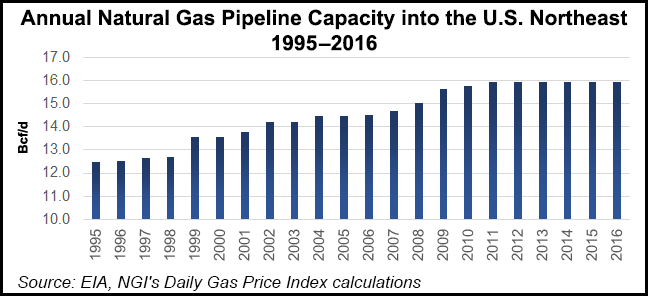Infrastructure | NGI All News Access
Bomb Cyclone Should Prompt More Northeast Gas Infrastructure, Says API Chief
As the Trump administration eyes an infrastructure initiative, it should include natural gas pipelines too, a necessity underscored by the recent cold snap, i.e. bomb cyclone, which brought the Northeast to a standstill, American Petroleum Institute (API) CEO Jack Gerard said Tuesday.

New England consumers pay higher electric bills “because of a lack of infrastructure,” which has repeatedly been pointed out by grid operator ISO New England, Gerard said in the annual State of American Energy address in Washington, DC. During the speech, he also pushed for retaining the benefits of the North American Free Trade Agreement.
An API-supported study last year estimated that more than $1 trillion could be invested in potential energy infrastructure through 2035.
“The recent cold snap highlighted the difference between policymakers and regions that embrace American energy abundance and those that do not,” Gerard said.
New Englanders pay more for power even though the region is adjacent to abundant natural gas in the Marcellus and Utica shales. In Ohio, for example, in the heart of Utica development, electricity prices have held steady or even declined during peak demand periods, Gerard said.
“We need policies that put consumers first,” he added, which allow for private investment to safely build infrastructure to meet the energy demands of everyone, every time, everywhere.”
Gerard said adding energy infrastructure would provide multiple macro-economic benefits and potentially add millions of jobs, with an average salary that could be about $50,000/year more than the average pay for a U.S. worker.
“This isn’t just about dollars and cents,” he said. “Getting the policy right on energy infrastructure will lead to greater reliability, safety, security and affordability.”
He pointed to last year’s hurricane recovery efforts in the Gulf Coast region, which he said were made easier by the resilience built into the region’s energy infrastructure. Those resiliency efforts helped to mitigate the impact of storms including Hurricane Harvey.
© 2024 Natural Gas Intelligence. All rights reserved.
ISSN © 1532-1231 | ISSN © 2577-9877 |
